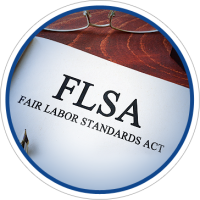Will Your Exempt Employees Still Be Exempt on January 1st?

Effective January 1, 2020, the minimum salary necessary for employees to qualify under various exemptions under the Fair Labor Standards Act (FLSA) will increase. On September 27, 2019 the U.S. Department of Labor (US DOL) issued a Final Rule regarding specific salary provisions for exemptions that apply to executive, administrative, professional, computer and highly compensated employees. These exemptions, together with an exemption for outside sales employees, are often referred to as the “white-collar exemptions.”
The FLSA requires employers to pay covered employees a minimum wage and overtime for hours worked in excess of 40 in a workweek. The FLSA does, however, include several exemptions from these minimum wage and overtime requirements for certain employees.
To qualify as an exempt employee under the FLSA white-collar exemptions, an employee must pass a three-part test. The first part of the test is the salary basis test. To meet this requirement, an employee must be paid a predetermined and fixed salary that is not subject to reduction because of variations in the quality or quantity of work performed.
The second part of the test is the salary level test. To meet this requirement, the employee must be paid a specified minimum salary level (standard salary level). The new regulation increases the minimum salary for executive, administrative, professional and computer employees from $455 per week ($23,660 annually), to $684 per week ($35,568 annually). Computer employees who are compensated on an hourly basis rather than a salary basis must be paid at a rate not less than $27.63 an hour.
The third part of the test is commonly known as the “duties test.” The duties test requires that the employee’s job duties must primarily involve executive, administrative, or professional duties.
US DOL’s Final Rule makes key changes in four specific areas of the white-collar exemption. Most notably, and as noted above, the standard salary level for exempt executive, administrative, professional and computer employees will rise to $684 per week ($35,568 annually). Secondly, the salary level for highly compensated employees will increase from $100,000 annually to $107,432 annually.
The new provisions will also allow employers to use nondiscretionary bonuses and incentive payments, including commissions, that are paid at least annually to satisfy up to 10% of the standard salary level.
Finally, the new provisions also revise salary levels for workers in U.S. territories and the motion picture industry. Affected U.S. territories include Puerto Rico, the U.S. Virgin Islands, Guam and the Commonwealth of the Northern Mariana Islands where the special salary level will increase to $455 per week. The special salary level will remain at $380 per week for American Samoa. For those in the motion picture industry, the base rate will rise to $1,043 per week.
As a result of these changes, the US DOL estimates that approximately 1.3 million employees who are currently classified as “exempt,” will become non-exempt. It is important for employers to determine whether this will affect the exemptions applicable to their workforce and make appropriate changes on or before January 1, 2020. Employers also should evaluate the job duties and salary basis of their exempt employees to ensure that they also comply with those components of the FLSA exemptions.
This Update is provided for informational purposes only. It is not intended as legal advice, nor does it create an attorney/client relationship between the Moore Law Group LLC and any readers or recipients. Readers should consult counsel of their own choosing to discuss how these matters relate to their individual circumstances. Reproduction in whole or in part is prohibited without the express written consent of Moore Law Group LLC.
This Update may be considered attorney advertising in some states. Furthermore, prior results do not guarantee a similar outcome.





